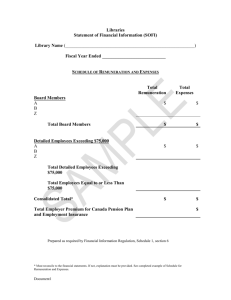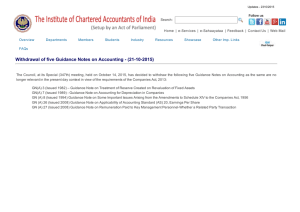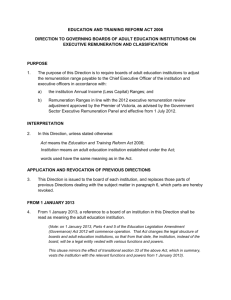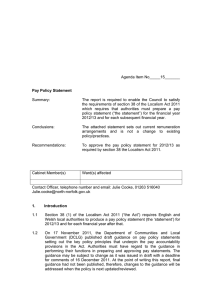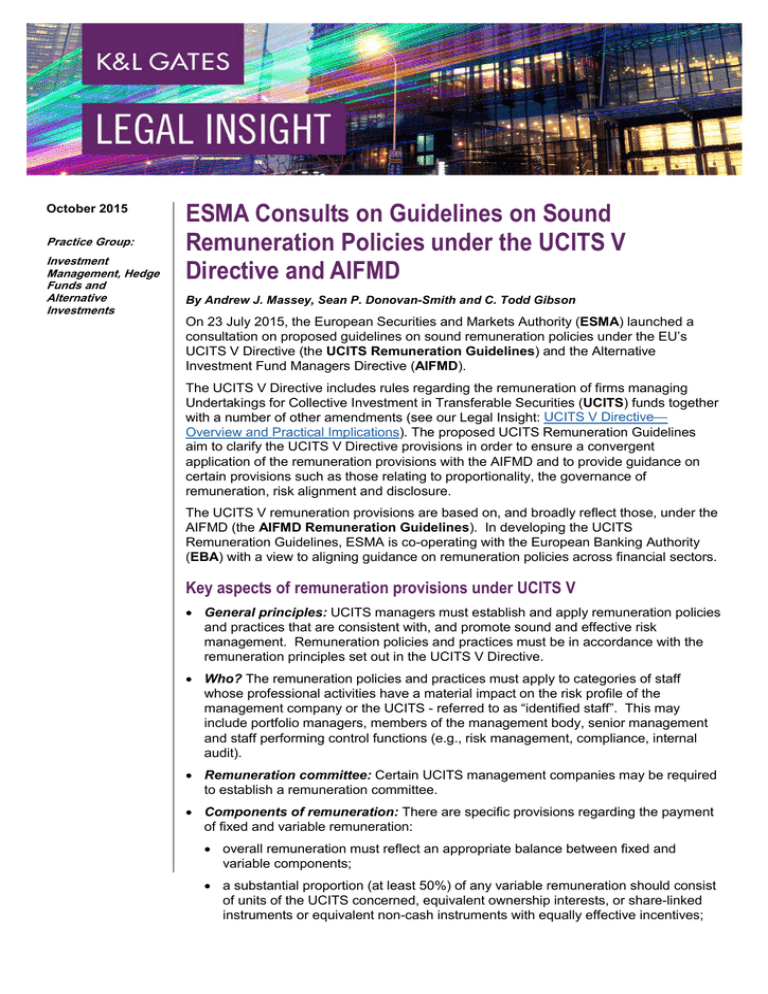
October 2015
Practice Group:
Investment
Management, Hedge
Funds and
Alternative
Investments
ESMA Consults on Guidelines on Sound
Remuneration Policies under the UCITS V
Directive and AIFMD
By Andrew J. Massey, Sean P. Donovan-Smith and C. Todd Gibson
On 23 July 2015, the European Securities and Markets Authority (ESMA) launched a
consultation on proposed guidelines on sound remuneration policies under the EU’s
UCITS V Directive (the UCITS Remuneration Guidelines) and the Alternative
Investment Fund Managers Directive (AIFMD).
The UCITS V Directive includes rules regarding the remuneration of firms managing
Undertakings for Collective Investment in Transferable Securities (UCITS) funds together
with a number of other amendments (see our Legal Insight: UCITS V Directive—
Overview and Practical Implications). The proposed UCITS Remuneration Guidelines
aim to clarify the UCITS V Directive provisions in order to ensure a convergent
application of the remuneration provisions with the AIFMD and to provide guidance on
certain provisions such as those relating to proportionality, the governance of
remuneration, risk alignment and disclosure.
The UCITS V remuneration provisions are based on, and broadly reflect those, under the
AIFMD (the AIFMD Remuneration Guidelines). In developing the UCITS
Remuneration Guidelines, ESMA is co-operating with the European Banking Authority
(EBA) with a view to aligning guidance on remuneration policies across financial sectors.
Key aspects of remuneration provisions under UCITS V
• General principles: UCITS managers must establish and apply remuneration policies
and practices that are consistent with, and promote sound and effective risk
management. Remuneration policies and practices must be in accordance with the
remuneration principles set out in the UCITS V Directive.
• Who? The remuneration policies and practices must apply to categories of staff
whose professional activities have a material impact on the risk profile of the
management company or the UCITS - referred to as “identified staff”. This may
include portfolio managers, members of the management body, senior management
and staff performing control functions (e.g., risk management, compliance, internal
audit).
• Remuneration committee: Certain UCITS management companies may be required
to establish a remuneration committee.
• Components of remuneration: There are specific provisions regarding the payment
of fixed and variable remuneration:
• overall remuneration must reflect an appropriate balance between fixed and
variable components;
• a substantial proportion (at least 50%) of any variable remuneration should consist
of units of the UCITS concerned, equivalent ownership interests, or share-linked
instruments or equivalent non-cash instruments with equally effective incentives;
ESMA Consults on Guidelines on Sound Remuneration
Policies under the UCITS V Directive and AIFMD
• a substantial proportion (at least 40%) of any variable remuneration should be
deferred over an appropriate period of time (at least 3 years); and
• there should be disclosure of details of the UCITS manager’s remuneration policy
and practices either in the UCITS’ prospectus or website, and disclosure of the
amount of remuneration paid for the financial year in the UCITS’ annual report.
Proportionality
UCITS managers are required to comply with the remuneration principles in a way and to
the extent that is appropriate to their size, internal organisation and the nature, scope and
complexity of their activities. The UCITS Remuneration Guidelines provide guidance on
the application of the proportionality principle.
There was a concern that ESMA would adopt the conservative approach to
proportionality taken by the EBA in its consultation on the CRD IV remuneration
principles (published on 4 March 2015). The approach expressed by the EBA is that
proportionality may affect the way the CRD IV remuneration principles are applied, but
the principles themselves cannot be disapplied (i.e., under the EBA approach
proportionality cannot be used to justify switching off any of the specific remuneration
requirements). However, the draft UCITS Remuneration Guidelines, in common with the
AIFMD Remuneration Guidelines, propose permitting the disapplication of certain
remuneration principles provided it is proportionate to do so.
Under the draft Guidelines, the requirements that may be disapplied - indeed the only
ones that may be disapplied - are requirements relating to:
• the payment of variable remuneration in instruments;
• the retention of variable remuneration;
• the deferral of payments of variable remuneration;
• ex post incorporation of risk for variable remuneration (malus or clawback); and
• the requirement to establish a remuneration committee.
Application to delegates
The definition of “identified staff” under the draft UCITS Remuneration Guidelines
includes “categories of staff at the entity(ies) to which investment management activities
have been delegated by the management company, whose professional activities have a
material impact on the risk profiles of the UCITS that the management company
manages”.
The draft UCITS Remuneration Guidelines, in line with the approach adopted under the
AIFMD Remuneration Guidelines, require management companies to ensure that:
• delegates are subject to regulatory requirements on remuneration that are equally as
effective as those applicable under the UCITS Remuneration Guidelines; or
• appropriate contractual arrangements are put in place to ensure there is no
circumvention of the remuneration rules.
ESMA indicates that delegates subject to the AIFMD or CRD IV rules may be regarded
as being subject to equally effective regulatory requirements. The UCITS Remuneration
Guidelines do not address the position for firms subject to CRD III or non-EU delegates.
As with other provisions of the UCITS directive, it will be important to monitor the
2
ESMA Consults on Guidelines on Sound Remuneration
Policies under the UCITS V Directive and AIFMD
development of the application of the remuneration requirements by local regulators,
particularly in the UK, Ireland and Luxembourg, in relation to delegates, such as subadvisers to UCITS, and/or U.S. sponsors or promoters of UCITS funds.
Disclosure requirements
Under UCITS V, certain disclosures regarding remuneration are required:
• details of the remuneration policy and practices are required to be disclosed either in
the UCITS’ prospectus or on the manager’s website (provided that if disclosed on the
manager’s website, a summary is provided in the UCITS’ prospectus); and
• the annual report of a UCITS must disclose the amount of remuneration paid by the
UCITS manager for the financial year (split into fixed and variable), the number of
beneficiaries and any amount paid out of the assets of the UCITS, including any
performance fee.
Amendment to AIFMD Remuneration Guidelines
ESMA is also taking the opportunity to consult on revisions to certain aspects of the
AIFMD Remuneration Guidelines. It is proposed to clarify that in a group context, nonAIFM sectoral prudential supervisors of group entities may deem certain staff of an AIFM
in that group to be identified staff for the purpose of their sectoral remuneration rules.
Providing comments to ESMA
ESMA invites comments on all elements of the consultation paper, and in particular:
• compliance impacts and costs for management companies in applying the
remuneration principles in any circumstances;
• compliance costs and impediments if management companies that also hold an
AIFMD licence and benefit from disapplication of certain of the remuneration rules
under the AIFMD Remuneration Guidelines were required to apply, for the variable
remuneration of identified staff, deferral arrangements, retention, the pay out of
instruments and the malus (with respect to the deferred variable remuneration);
• definition of “performance fees”;
• overlap between the proposed definition of “supervisory function” in the UCITS
Remuneration Guidelines and the definition of “management body” in the UCITS V
Directive text;
• practical performance of services subject to different sectoral remuneration principles;
• operational difficulties of the proposed “pro rata” approach;
• proposed alternative approach providing for management companies to decide to
voluntarily opt for the sectoral remuneration rules, deemed as being more effective in
terms of avoiding excessive risk taking and ensuring risk alignment, and apply them to
all the staff performing services subject to different sectoral remuneration rules;
• submission of the performance of ancillary services by personnel of a management
company or an AIFM to the remuneration principles under UCITS Directive or AIFMD;
• proposal to look at individual entities for the purpose of the payment instruments of at
least 50% of the variable remuneration;
3
ESMA Consults on Guidelines on Sound Remuneration
Policies under the UCITS V Directive and AIFMD
• need to include some transitional provisions relating to the date of application of the
UCITS Remuneration Guidelines;
• assessment of costs and benefits for the proposal on proportionality;
• assessment of costs and benefits above for the proposal on the application of different
sectoral rules to staff.
Timetable for finalisation of UCITS Remuneration Guidelines
ESMA will consider all comments received by 23 October 2015 and will finalise and
publish the UCITS Remuneration Guidelines based on the feedback received to the
consultation. Although the deadline for transposition of the UCITS V directive is 16
March 2016 and it was expected the final version of the UCITS Remuneration Guidelines
to be published prior to that date, recent reports indicate that the final text may not be
issued until after the transposition deadline which may create challenges and uncertainty
for many UCITS managers. UCITS managers would be in a situation where they would
be required to comply with the text of the UCITS V Directive, but not have the benefit of
the “level two” rules or sufficient time to implement such rules into their policies and
procedures.
For managers wishing to provide comments on the consultation to ESMA, or
seeking advice on the impact of the UCITS V Directive, please contact your usual
Investment Management contact at K&L Gates LLP.
Authors:
Andrew J. Massey
Sean P. Donovan-Smith
C. Todd Gibson
andrew.massey@klgates.com
+44.(20).7360.8233
sean.donovan-smith@klgates.com
+44.(20).7360.8202
todd.gibson@klgates.com
+1.412.355.8315
+1.617.261.3140
Anchorage Austin Beijing Berlin Boston Brisbane Brussels Charleston Charlotte Chicago Dallas Doha Dubai Fort Worth Frankfurt
Harrisburg Hong Kong Houston London Los Angeles Melbourne Miami Milan Moscow Newark New York Orange County Palo Alto
Paris Perth Pittsburgh Portland Raleigh Research Triangle Park San Francisco São Paulo Seattle Seoul Shanghai Singapore
Spokane Sydney Taipei Tokyo Warsaw Washington, D.C. Wilmington
K&L Gates comprises more than 2,000 lawyers globally who practice in fully integrated offices located on five
continents. The firm represents leading multinational corporations, growth and middle-market companies,
capital markets participants and entrepreneurs in every major industry group as well as public sector entities,
educational institutions, philanthropic organizations and individuals. For more information about K&L Gates or
its locations, practices and registrations, visit www.klgates.com.
This publication is for informational purposes and does not contain or convey legal advice. The information herein should not be used or relied upon
in regard to any particular facts or circumstances without first consulting a lawyer.
© 2015 K&L Gates LLP. All Rights Reserved.
4

